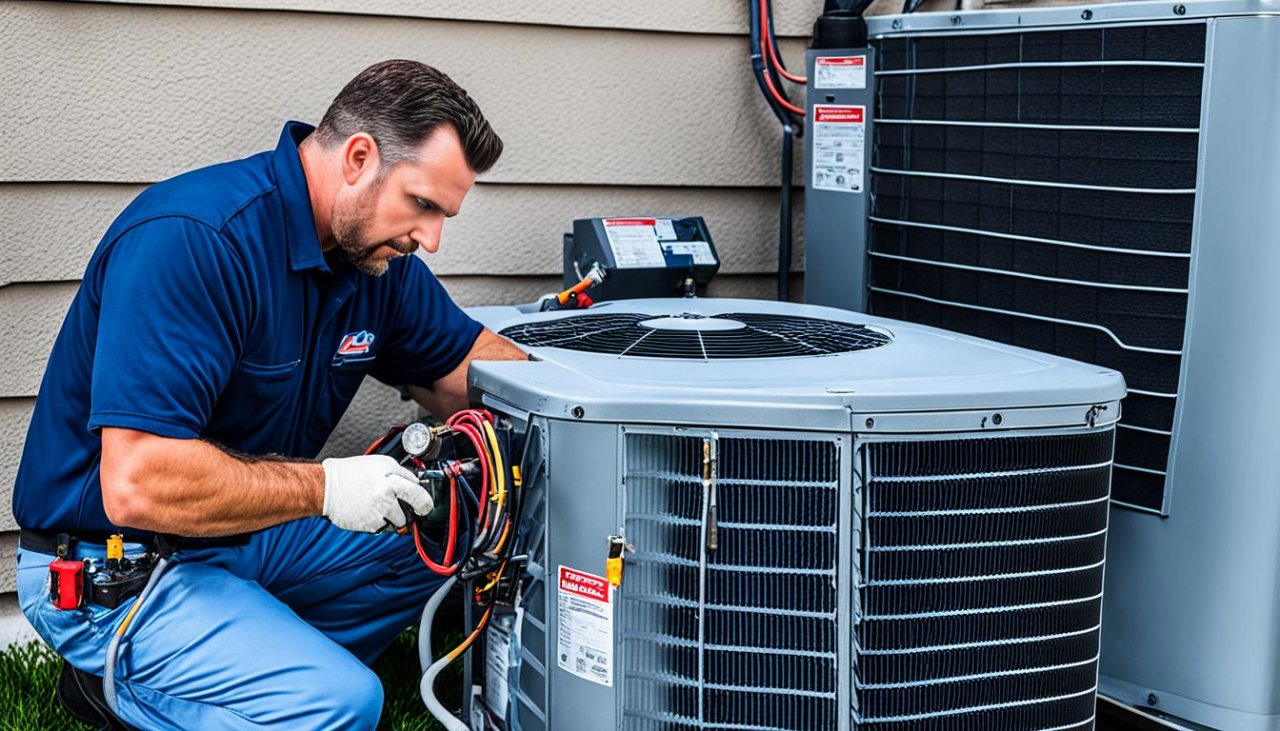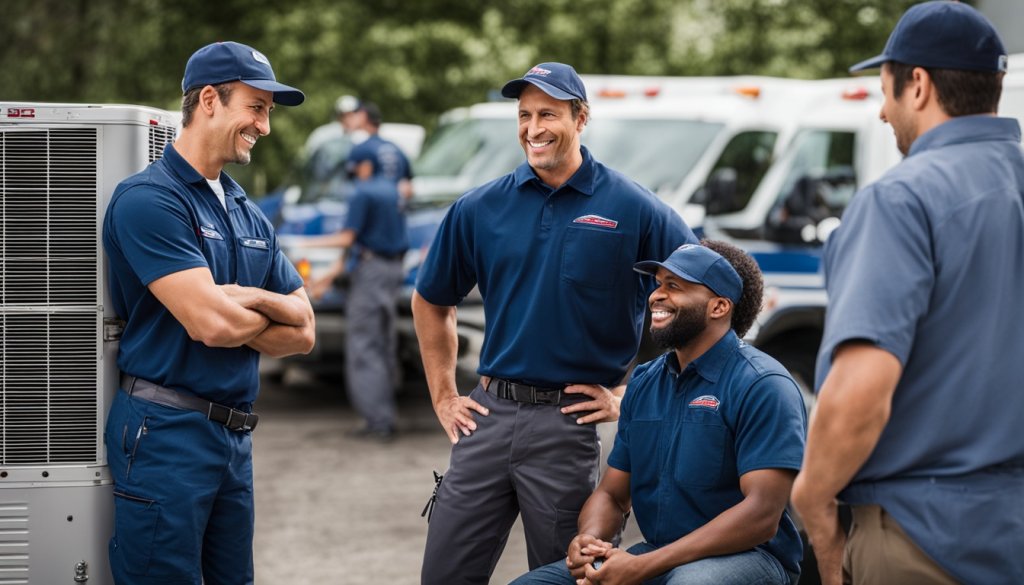Running a successful HVAC business goes beyond providing exceptional heating and cooling services. It’s also about delivering outstanding customer service that keeps your clients coming back for more. In fact, HVAC customer service plays a crucial role in the growth and long-term success of your business. With satisfied customers more likely to seek repairs and refer friends and family, investing in a skilled customer service team is essential.
Let me share a story to illustrate the importance of HVAC customer service. Meet Sarah, a homeowner who recently encountered a problem with her HVAC system. She had dealt with several HVAC contractors in the past, but none had left a lasting impression. Frustrated, Sarah decided to try a new company, AC Solutions.
When Sarah called AC Solutions, she was greeted by friendly and knowledgeable customer service representative named Emma. Emma patiently listened to Sarah’s concerns and addressed all her questions. She then promptly scheduled an appointment for an HVAC technician to assess the system. Throughout the call, Emma’s exceptional communication skills and empathy made Sarah feel heard and valued as a customer.
When the AC Solutions technician arrived at Sarah’s home, they were professional, skilled, and transparent about the service and costs involved. The technician efficiently resolved the issue, leaving Sarah completely satisfied. Impressed by the entire experience, Sarah not only left a glowing online review for AC Solutions but also recommended the company to her friends and family.
This story demonstrates how effective HVAC customer service leads to customer satisfaction, repeat business, and positive word-of-mouth referrals. But what exactly makes a skilled customer service representative (CSR) in the HVAC industry?

Key Takeaways:
- Good HVAC customer service leads to customer retention and positive reviews.
- A skilled CSR plays a pivotal role in managing customer interactions and bookings.
- Essential skills for an HVAC CSR include strong communication, technical knowledge, patience, and empathy.
- Building trust with customers involves being friendly, responsive, knowledgeable, patient, clear about costs, and following up post-service.
- Continuous learning and training are essential for HVAC CSRs to enhance their skills and provide exceptional customer service.
The Importance of HVAC Customer Service
HVAC customer service is a critical aspect of running a successful HVAC business. It encompasses the entire customer experience, from the initial contact to after-service support. Investing in excellent HVAC customer service can lead to increased customer satisfaction, higher customer retention rates, and more referrals, ultimately boosting the profitability of your HVAC contracting company.
Providing exceptional customer service is essential in an industry where customer satisfaction directly impacts the success of your business. Happy customers are more likely to continue using your services repeatedly, leading to a loyal customer base. Repeat customers not only generate a steady stream of revenue but also become advocates for your HVAC business, recommending you to friends, family, and colleagues.
Customer service in the HVAC industry goes beyond just repairing and maintaining HVAC systems. It involves effective communication, understanding customer needs, and offering personalized solutions. By prioritizing HVAC customer service, you can build strong relationships with your clients, earning their trust and loyalty.
Moreover, positive customer experiences contribute to a strong online reputation. Satisfied customers are more likely to leave positive reviews and recommendations, which can increase your credibility and give you a competitive advantage in the market. With the rising importance of online reviews, a satisfied customer base can significantly impact the growth and success of your HVAC business.
Effective HVAC customer service involves utilizing various communication channels, such as phone, email, and online chat, to connect with your customers. This multi-channel approach allows you to cater to your customers’ preferences and ensure their satisfaction. Additionally, offering flexible scheduling options demonstrates your commitment to customer needs and values their time, enhancing the overall customer experience.
The HVAC industry is constantly evolving, with rapid technological advancements aimed at improving energy efficiency and sustainability. By staying up-to-date with these innovations and offering eco-friendly HVAC solutions, you can meet the demands of environmentally-conscious customers and stand out from competitors.
In summary, HVAC customer service plays a pivotal role in the success of your HVAC business. By providing exceptional customer service, you can enhance customer satisfaction, improve customer retention, and generate valuable referrals. Investing in HVAC customer service is an investment in the long-term growth and profitability of your business.
The Role of a CSR in HVAC
In the dynamic world of HVAC, customer service representatives (CSRs) play a vital role in ensuring customer satisfaction and driving the success of HVAC companies. As the first point of contact for customers, CSRs are responsible for booking calls, providing customer support, and delivering exceptional service throughout the customer journey. Let’s explore the crucial responsibilities and skills of a CSR in the HVAC industry.
A CSR in an HVAC company is primarily responsible for managing customer interactions, both in-person and over the phone. They handle inquiries, answer questions promptly, provide price breakdowns, and offer information on discounts and rebates. By effectively explaining the benefits of service plans and the advantages of new equipment installations, CSRs contribute to customer retention and company growth.
Effective communication is key to success in the CSR role. CSRs must possess excellent verbal and written communication skills to ensure clear and concise customer interactions. They articulate the value of HVAC services, addressing customer concerns and building trust. By demonstrating knowledge about specific service offerings, CSRs help customers make informed decisions and enhance their overall satisfaction.
A CSR’s role also extends to efficient appointment scheduling. CSRs manage the company’s calendar, coordinating with technicians and customers to ensure timely service delivery. By juggling multiple appointments and priorities, CSRs ensure that customer needs are met while optimizing internal operations.
Working as a CSR in the HVAC industry offers numerous benefits. Job security is a significant advantage, as the industry is considered pandemic-proof and recession-proof. Additionally, CSRs enjoy a good work-life balance, allowing them to maintain a steady work history and focus on their role’s demands.
Moreover, HVAC companies value their CSRs and provide competitive starting pay as well as signing bonuses. The pay scale is based on experience, which is discussed during the interview. Besides financial incentives, companies like O’Brien Service Company offer a comprehensive benefits package, including 401(k), dental insurance, health insurance, parental leave, paid time off, and vision insurance.
The qualifications for a CSR position typically include a preference for 1-2 years of inside sales or telemarketing experience. However, excellent communication skills and the ability to work independently and as part of a team are equally important. HVAC companies, like O’Brien Service Company, prioritize values such as honesty, integrity, excellence, self-motivation, and teamwork to foster a positive and collaborative work environment.
In conclusion, customer service representatives are the frontline ambassadors of an HVAC company. Their role is multi-faceted and crucial to improving customer satisfaction and driving business success. With their expertise in booking calls, providing exceptional customer support, and effectively articulating the value of HVAC services, CSRs contribute to customer retention and company growth in the fuels and HVAC sector.
Creating a Skilled HVAC Customer Service Team
Excellent customer service is a critical factor in the success of any HVAC business. It not only leads to increased customer loyalty and repeat business but also enhances the overall reputation of the company. To deliver exceptional HVAC customer service, it is essential to build a skilled customer service team. From the HVAC customer service representative (CSR) to the technicians, every member plays a crucial role in ensuring customer satisfaction.
A skilled HVAC CSR is the frontline representative of the company, responsible for handling customer inquiries and resolving concerns. They should possess strong communication skills and be knowledgeable about HVAC systems to address customer queries efficiently. However, technical knowledge alone is not enough. The ability to empathize with customers, actively listen to their needs, and provide personalized support is equally important.
Consistency is key when it comes to implementing customer service processes. From the moment customers make their initial inquiries to the completion of the service, every interaction should be seamless and aligned with the company’s customer service standards. The staff should receive regular training sessions to continuously enhance their communication skills, technical knowledge, and problem-solving abilities.
One way to empower HVAC CSRs is by utilizing the right software tools. ServiceTitan’s HVAC software features are designed to efficiently manage service contractor businesses while providing exceptional customer service. With call booking software, CSRs have access to vital customer information, enabling them to personalize interactions. The software automates customer call information, reducing call time and enhancing efficiency in booking services.
Moreover, ServiceTitan’s software keeps track of HVAC technicians’ real-time locations, allowing for fast response times and punctuality. Automated job confirmation texts help reduce customer no-shows and save time on confirmation calls. Field dispatch software enables customers to receive automated notifications and track technician progress. ServiceTitan Mobile provides technicians with all necessary customer job details, allowing them to deliver exceptional service on-site.
Offering on-the-spot estimates, payments, and financing options is another way to improve the customer experience. ServiceTitan Mobile allows technicians to build accurate estimates, capture payments on-site, and offer financing options. With the integration of financing options, techs can show customers available financing plans and complete applications on the spot, ensuring a seamless process.
By investing in a skilled HVAC customer service team and leveraging the right tools, HVAC businesses can deliver personalized and efficient customer support, leading to high customer satisfaction, increased loyalty, and long-term business growth.

Utilizing Digital Channels for Enhanced Customer Experience
In today’s competitive HVAC business landscape, optimizing digital channels is essential for creating an exceptional customer experience. By leveraging the power of digital marketing, HVAC companies can enhance their online presence, improve customer communication, and ultimately drive business growth.
Enhanced visibility through digital marketing strategies allows HVAC businesses to reach a broader audience and attract potential customers. By utilizing search engine optimization (SEO), pay-per-click (PPC) advertising, social media marketing, and email campaigns, HVAC companies can effectively target specific demographics and locations, increasing their chances of connecting with interested prospects.
Social media engagement and email marketing play a crucial role in customer involvement, relationship building, and providing valuable information. Through engaging content, visual assets, targeted ads, and collaborations with influencers, HVAC businesses can build brand awareness, foster customer engagement, and establish themselves as industry leaders.
Implementing digital marketing techniques not only improves customer communication but also revolutionizes brand reputation management. By actively engaging with customers on social media platforms, addressing concerns, and showcasing exceptional customer service, HVAC companies can build trust, loyalty, and positive brand perception.
Moreover, digital marketing provides cost-effective solutions for HVAC businesses, allowing them to measure results and adjust marketing strategies accordingly. By analyzing web page clicks, conversion rates, and customer acquisition data, HVAC companies can make informed decisions and allocate resources more effectively.
To elevate online presence further, HVAC companies must focus on key components such as content optimization, mobile-friendly design, technical SEO, and local SEO. These strategies ensure that the business is easily discoverable, delivers a seamless user experience, and ranks higher in search engine results, ultimately attracting more potential customers.
In conclusion, embracing digital channels is crucial for enhancing the customer experience in the HVAC industry. With an optimized online presence, targeted advertising, effective customer communication, and data-driven marketing strategies, HVAC businesses can cultivate strong relationships with customers, increase conversions, and drive overall business growth.
Prioritizing Rapid Response for Customer Service
In the fast-paced HVAC industry, rapid response is paramount for customer satisfaction. According to a Lead Connect study, 78% of customers choose the first responder when making a purchase decision. Additionally, 64% of customers expect real-time interaction and response from companies, as per Salesforce research.
Rapid response time not only contributes to ease of customer acquisition but also fosters immediate trust, as evident from numerous positive reviews on Google. To ensure quick and efficient response to customer inquiries, it is crucial to establish efficient communication channels between dispatch teams and field technicians.
One way to optimize response times is by implementing technology that enables real-time updates and tracking. This allows HVAC businesses to swiftly address customer needs, especially in emergency situations. Additionally, investing in training programs for dispatch teams ensures they can provide quick and accurate responses, enhancing overall customer support and satisfaction.
Moreover, incorporating mobile technology in HVAC operations facilitates rapid communication and enables seamless interactions with customers. Mobile applications designed for quick dispatch and communication streamline workflow processes, contributing to enhanced customer service.
Measuring response time through key performance indicators (KPIs) is crucial for business monitoring and performance improvement. Utilizing data analytics helps refine lead response strategies and stay ahead in a competitive HVAC industry.
Implementing efficient Customer Relationship Management (CRM) systems aids in managing customer data effectively and provides valuable insights for personalized customer support. Integration with online platforms ensures immediate incorporation of leads into workflows, maximizing conversion opportunities.
Telephone answering services like Centratel play a vital role in managing call influx during peak seasons, ensuring genuine emergencies are prioritized. Their trained operators, equipped with HVAC terminology, efficiently handle customer queries, enhancing customer understanding and satisfaction.
In HVAC emergencies such as gas leaks, immediate action is crucial. Efficient communication provided by Centratel’s service helps minimize downtime and ensure swift resolutions, as they promptly deliver messages through various channels like email, SMS, alpha-pager, or fax.
In summary, prioritizing rapid response in the HVAC industry is essential for customer satisfaction and loyalty. Efficient communication, technology implementation, and training programs contribute to seamless support, ultimately leading to delighted customers and a reputable business in the community.
Embracing Omnichannel Communication
In today’s digital age, HVAC businesses need to adapt to consumers’ changing preferences and engage with them through various communication channels. Embracing omnichannel communication is the key to effectively connecting with customers and enhancing their satisfaction.
By adopting an omnichannel approach, HVAC businesses can cater to customer preferences and provide a seamless experience across different channels. Whether it’s social media platforms like Facebook, Twitter, Instagram, and LinkedIn, or traditional communication methods like phone calls and emails, each channel offers unique opportunities to engage with customers and build a loyal base.
One of the advantages of omnichannel communication is the ability to reach customers where they are most comfortable. Some customers may prefer interacting on social media, while others may prefer the convenience of phone calls or emails. By offering multiple channels, HVAC businesses can cater to diverse customer preferences and ensure that they can easily connect with the company.
Implementing an omnichannel strategy also enhances customer engagement. By being present on various platforms, HVAC businesses can share valuable content, such as informative blog posts, videos, and podcasts, establishing themselves as industry experts and building trust with customers. This engagement not only enhances brand visibility but also fosters a strong sense of community support.
Furthermore, embracing omnichannel communication contributes to overall customer satisfaction. By providing customers with the flexibility to choose their preferred communication channel, HVAC businesses demonstrate that their customers’ needs and preferences are a top priority. This personalized approach creates a positive customer experience and fosters long-term loyalty.
Overall, HVAC businesses that embrace omnichannel communication can significantly boost their visibility, engage customers on their preferred channels, and enhance overall marketing effectiveness. By catering to customer preferences and providing a seamless and personalized experience, HVAC businesses can drive higher customer satisfaction and ultimately secure a competitive edge in the market.

Offering Flexible Appointment Scheduling
When it comes to providing exceptional customer convenience and a seamless customer experience, appointment scheduling plays a crucial role in the HVAC business. With the advancement of technology, HVAC companies now have the opportunity to offer flexible appointment scheduling through an online scheduling system. This not only benefits customers but also contributes to enhanced operational efficiency and customer management for HVAC businesses.
An online scheduling system allows customers to book appointments at their preferred time and date, eliminating the need for phone calls or in-person visits. This provides a convenient and hassle-free experience, giving customers the freedom to schedule appointments at their convenience, 24/7. Moreover, online scheduling software provides a 100% confirmed appointment for customers, ensuring a reliable and efficient service delivery process.
One of the key advantages of an online scheduling system for HVAC businesses is the ability to customize the scheduling feature according to their specific needs. Companies can determine the types of appointments, booking times, and how far in advance customers can schedule, offering flexibility that caters to their unique business requirements. This level of customization promotes a customer-centric approach, allowing HVAC businesses of any size to create a branded landing page that reflects their unique offerings and services.
By integrating a reminder feature into the HVAC software, businesses can further enhance customer engagement. The software can send email or text alerts to customers for tune-ups or regular maintenance, ensuring that they never miss an important appointment. This not only helps in improving customer satisfaction but also strengthens the customer-business relationship, resulting in increased loyalty and repeat business.
Furthermore, the automation capabilities of HVAC scheduling software streamline operations and boost staff efficiency. Automation reduces human errors and minimizes scheduling complexities, ensuring that technicians are assigned to appointments based on predefined criteria. Dispatching in HVAC software suggests efficient routes for technicians using GPS technology and real-time traffic data, reducing travel time and ensuring timely service delivery.
With mobile accessibility in HVAC software, technicians can stay connected and update job statuses in real time. This enables efficient communication between technicians, office staff, and clients, facilitating better coordination and ensuring a smooth workflow. Additionally, inventory management integration in HVAC software allows tracking and managing levels of parts and equipment, ensuring proper inventory coordination for efficient service provision and customer satisfaction.
In conclusion, offering flexible appointment scheduling through an online scheduling system is an essential aspect of providing an exceptional customer experience in the HVAC industry. By leveraging the benefits of online scheduling software, HVAC businesses can enhance customer convenience, streamline operations, boost staff efficiency, and ultimately, drive business growth.
Acting on Customer Feedback
Customer feedback is crucial for continuous improvement in HVAC services and enhancing customer satisfaction. By actively encouraging customers to provide feedback and taking swift action on their suggestions, HVAC businesses can make tangible improvements and tailor their services to better meet customer needs.
One effective way to gather customer feedback is through post-service surveys or follow-up emails. These surveys can provide valuable insights into customers’ experiences, identifying areas where improvements can be made. Additionally, integrating Podium Reviews or other reputation management platforms can help HVAC businesses monitor and respond to customer feedback effectively.
Analyzing customer feedback is not only about identifying areas for improvement but also leveraging positive feedback. Positive reviews play a crucial role in boosting an HVAC company’s online reputation and credibility. Potential customers heavily rely on reviews when selecting HVAC companies in their area, making positive reviews a valuable virtual word-of-mouth referral system.
By showcasing positive reviews on websites, social media platforms, and even email campaigns, HVAC businesses can attract new customers and build credibility. Favorable reviews instill confidence in potential customers, increasing the likelihood of them choosing the HVAC company for their service needs.
Acting on customer feedback not only benefits the customer but also contributes to the growth and improvement of HVAC services. By analyzing feedback and implementing necessary changes, HVAC businesses can enhance service quality, address pain points, and exceed customer expectations.
Furthermore, customer feedback can guide HVAC businesses in developing innovative solutions and services that cater to evolving customer needs. This proactive approach to continuous improvement ultimately leads to increased customer satisfaction and loyalty.
Ultimately, a customer-centric approach that prioritizes customer feedback and takes action on it can help HVAC businesses thrive in a competitive market. Improving customer retention rates and increasing customer satisfaction not only boosts the company’s reputation but also drives growth and profitability. Loyal customers tend to spend more and are up to 10 times more valuable than new customers, highlighting the importance of cultivating strong customer relationships through excellent service delivery.
In conclusion, actively encouraging and acting on customer feedback is vital for continuous improvement in customer service in the HVAC industry. By leveraging valuable insights, addressing pain points, and exceeding customer expectations, HVAC businesses can cultivate a loyal customer base and establish a positive online reputation.
Enhancing Online Reputation and Brand Building
Building a strong online presence and managing your reputation is essential for HVAC businesses. In today’s digital age, customers heavily rely on online reviews and ratings when making purchasing decisions. In fact, 85% of buyers trust online reviews as much as personal recommendations in the HVAC industry. Ensuring positive reviews and proactive reputation management can significantly impact your brand visibility, customer loyalty, and overall success.
One exemplary company that has successfully built a stellar online reputation is ProSkill Services. As an HVAC, plumbing, and electrical services provider in Arizona, they have accumulated over 7,000 Google reviews with a 5-star rating and almost 800 Facebook recommendations. Their commitment to delivering exceptional service has undoubtedly contributed to their strong online presence and positive brand image.
When it comes to reputation management, using tools like ServiceTitan’s reputation management feature can streamline the process. ServiceTitan’s platform allows HVAC businesses to automate review requests to customers via text or email immediately after a job is marked as complete. This results in an increase in reviews, which in turn boosts online visibility and brand credibility.
Moreover, ServiceTitan users receive immediate notifications of new customer reviews, enabling fast responses, particularly to negative reviews. This proactive approach helps prevent reputation damage and demonstrates the business’s commitment to customer satisfaction and engagement. By consolidating reviews from various platforms like Yelp, Facebook, and Google, the Reputation Management feature on ServiceTitan simplifies review management for HVAC businesses.
ServiceTitan’s platform also facilitates the tracking and matching of reviews to individual technicians, customers, and jobs. This capability aids in identifying technicians who may be generating negative feedback, allowing the business to proactively address any issues and improve customer satisfaction. Additionally, ServiceTitan updates and maintains accurate business listings on over 60 platforms, ensuring potential customers can find correct information about an HVAC business, ultimately enhancing brand visibility.
To optimize your online presence and improve brand visibility, implementing solid SEO practices is crucial. Nine out of ten clients check online reviews before hiring a service, and nearly 75% of consumers ‘always’ or ‘regularly’ read online reviews before making a purchase. By incorporating relevant keywords and focusing on local SEO optimization, HVAC businesses can increase their visibility among potential customers in their service area.
It’s important to note that most customers access services and read reviews on mobile devices. Therefore, having a mobile-friendly website is essential for providing a seamless user experience and capturing potential customers’ attention. Furthermore, building trust through consistent marketing efforts like email campaigns and direct mail initiatives can help keep your brand top-of-mind with customers and further enhance your reputation.
Satisfied customers are more likely to leave positive reviews, recommend your services to others, and remain loyal to your brand. In fact, research indicates that businesses with an average rating below three stars risk losing 71% of potential customers. That’s why effective online reputation management is an ongoing process that requires continuous monitoring, adjustment, and improvement. By actively engaging with customer feedback, promptly responding to all reviews, and consistently delivering exceptional service, you can enhance customer satisfaction, attract new business, and build a strong brand that stands out in the HVAC industry.
Conclusion
Improving customer satisfaction, operational efficiency, and the overall customer experience is essential for the success of any HVAC business. By prioritizing customer service, utilizing digital channels, offering rapid response, embracing omnichannel communication, providing flexible appointment scheduling, acting on customer feedback, enhancing online reputation, and utilizing advanced HVAC technology, businesses in this industry can thrive in a competitive market.
With the HVAC industry projected to grow significantly in the coming years, there is ample opportunity for HVAC businesses to expand their customer base and increase revenue. It is crucial for HVAC contractors to focus on delivering exceptional customer service, as it is the primary means of generating revenue through repeat service visits and building long-term customer relationships.
By understanding the needs and preferences of customers, HVAC businesses can tailor their services accordingly and achieve higher levels of customer satisfaction. This can result in increased customer loyalty, positive word-of-mouth referrals, and higher profitability.
Additionally, staying abreast of industry trends, investing in employee training and development, and adopting technology solutions such as Customer Relationship Management (CRM) software can further enhance operational efficiency and customer experience. By implementing these strategies, HVAC businesses can position themselves for growth and establish a strong presence in the market.
See how FieldAx can transform your Field Operations.
Try it today! Book Demo
You are one click away from your customized FieldAx Demo!
FAQ
How can I improve customer satisfaction in my HVAC business?
You can improve customer satisfaction in your HVAC business by prioritizing customer service, providing skilled HVAC customer service teams, leveraging digital channels, offering rapid response, embracing omnichannel communication, providing flexible appointment scheduling, acting on customer feedback, enhancing online reputation, and utilizing advanced HVAC technology. These strategies will enhance the overall customer experience and lead to higher customer satisfaction.
What is the importance of HVAC customer service?
HVAC customer service plays a vital role in the success of an HVAC business. It results in customer satisfaction, retention, and referrals, leading to business growth. By focusing on HVAC customer service, you can improve customer loyalty and boost profits.
What is the role of a CSR in HVAC?
A CSR, or customer service representative, is a key player in HVAC customer service. They handle the initial contact with customers, book calls, answer customer questions, and address concerns. A skilled CSR can build trust with customers, manage appointments, and ensure a smooth customer experience.
How do I create a skilled HVAC customer service team?
To create a skilled HVAC customer service team, you should focus on hiring individuals with strong communication skills and technical knowledge of HVAC systems. By investing in training and developing your customer service team, you can ensure a high level of customer satisfaction and create a positive reputation in the industry.
How can I utilize digital channels for an enhanced customer experience?
By having a user-friendly website and active social media accounts, you can provide easy customer communication and important information about your business. Optimizing your digital channels will attract more customers and improve overall customer satisfaction.
Why is rapid response important for customer service?
Rapid response is crucial for customer satisfaction, especially during extreme weather conditions. By prioritizing rapid response and offering 24/7 customer service, you can stand out from the competition and ensure that your customers receive timely support and solutions.
How can I embrace omnichannel communication?
Embracing omnichannel communication means adopting multiple communication channels to cater to customers’ preferences. Some customers may prefer phone calls, while others may opt for emails or social media interactions. By offering multiple communication channels, you can meet customers where they are most comfortable and enhance overall customer satisfaction.
How can I offer flexible appointment scheduling?
You can offer flexible appointment scheduling by providing customers with an easy-to-use online scheduling system. This empowers customers to book appointments at their convenience, increasing customer satisfaction and allowing your workforce to focus on providing quality service.
Why is acting on customer feedback important?
Acting on customer feedback is invaluable for improving customer service. By actively encouraging customers to provide feedback and taking action on their suggestions, you can make continuous improvements, tailor your services to customer needs, and ultimately enhance customer satisfaction.
How can I enhance my online reputation and brand building?
You can enhance your online reputation and brand building by building a strong online presence, engaging with customers on review platforms, and getting involved in the community. Positive online reviews and active engagement can significantly improve brand visibility, customer loyalty, and overall customer satisfaction.
Author Bio
Co-Founder & CMO at Merfantz Technologies Pvt Ltd | Marketing Manager for FieldAx Field Service Software | Salesforce All-Star Ranger and Community Contributor | Salesforce Content Creation for Knowledge Sharing






